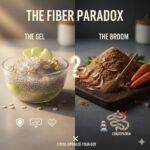
I used to recommend 1 g per pound of body weight as a minimum protein intake. I also recommended on occasion, that people eat more protein than that, even though they couldn’t possibly absorb all of it, in order to increase their metabolic rate. Protein is a very high metabolic food, and the excess isn’t usually stored as fat because the body would rather burn it off instead of going to all the trouble of the elaborate and complicated conversion process to turn it into fat.
Another reason I would recommend high-protein intake to some people was to give them a higher metabolic food that would fill them up and would therefore necessarily crowd out their consumption of other calories – namely fast carbs like sugars and starches. For people with overheating issues and heavy cravings for “fast carb” type foods, this is actually a pretty effective strategy and I still advise this approach on occasion.
In studying the current research, I am always learning new things every day and since the recent research has indicated that high protein isn’t as necessary as we used to think, I have been experimenting with my own physiology by eating less protein myself. I used to eat 250 g of protein or more per day but I cut that down to about 90 to 120 g per day. The muscle magazines out there would tell you this is a dire mistake because I would be losing muscle cutting back this much, being the ectomorph body type that I am. The main reason they say that however, is because they are marketing and selling protein supplements, so they make less money on people like me than the people they convince need 300 or more grams per day.
My experience over the last six months since I have cut my protein intake and half, has been that my muscle is exactly the same (I’m not trying to gain more muscle FYI), and my body fat has also remained the same – at around 7 or 8%. I am also eating about the same amount of green vegetables as ever, which is a lot. In fact, I eat about a pound of dark green vegetables every day. I also drink about 24 ounces of juice, derived mainly from green vegetables, which is nutritionally equivalent to another 2 lbs. of green vegetables. My fat intake has increased quite a bit though, and in fact, has increased my total calorie intake by about 300 calories per day over my previous high-protein habits.
A traditional dietitian would tell you that I would gain about two pounds of body weight every month on this calorie increase, but that’s just because their information is outdated. Most dietitians are still preaching the “calorie in-calorie out” theory, which continues to be proven wrong by millions of dieters every year. The reason I’m not gaining 2 pounds every month on my increased calorie intake, is because over 95% of my carbohydrate calories are coming from vegetables. It’s impossible to gain body fat eating vegetables. Most dietitians haven’t been taught that however, so they will continue to claim that all calories are created equal and it doesn’t matter where they come from.
Dietitians will also tell you that calories coming from protein and fat are also just as fattening as any carb calories, which isn’t the case either. Fast carbs are the type of calorie that is the most fattening. The reason I specify “fast” carbs is because all carbohydrate calories are not all created equal either. Broccoli is mostly carbohydrates, but overeating broccoli will actually make you thinner instead of fatter. Twinkies on the other hand, are a fast carb, so overeating those will make you fatter quite rapidly. Broccoli and Twinkies are both carb foods, but one will make you fat and the other will make you thin.
Those last couple paragraphs might have seemed like a rabbit trail, but they are part of my explanation for my revised protein recommendations. I am now telling people to eat between 70 g per day (for small women), to 175 g per day (for large men). Eating more than 200 g per day just isn’t realistic for most people. It’s really hard to eat that much protein in a day without frequent protein powder supplementation. Since I’m not a big fan of supplements as a general rule, I would prefer that people get their macronutrient needs as well as micronutrient needs from food if possible.
This revised protein recommendation does however require keeping a closer eye on “fast” carb intake each day since the extra protein isn’t pushing out the carb calories. My revised recommendations are also easier for vegetarians (and especially vegans) to follow.
Eating protein for breakfast is also a great habit to establish because numerous studies show that consuming of protein breakfast instead of the normal high carbohydrate breakfast foods keeps blood sugar more consistent through the day which reduces incidences of sugar cravings and over eating due to high levels of hunger.
The bottom line is, protein is great and I’m still a big fan of it, but as long as you are willing to eat tons of green vegetables and become obsessive over those first, that’s really the most important thing. Then getting the right kind of fat in your diet is next on the list of importance. Fats such as coconut oil, avocado oil and butter from grass fed cows even have special components that stoke your fat burning metabolism to help you burn body fat, but this subject is another post. Next, emphasize getting your protein in. Be sure to get clean protein though, as in organic sources because the other stuff is downright toxic and will destroy your fat burning efforts.
I used to recommend protein as the first priority, green veggies second and fat last, but now I’m shifted to recommending veggies first, fat second and protein last. This will optimize your nutrient intake better as well as help you burn fat faster, but takes a bit more discipline.









